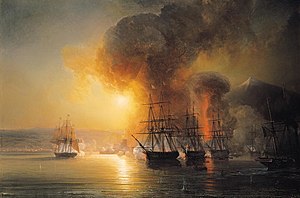This article needs additional citations for verification. (April 2022) |
| Battle of Veracruz | |||||||||
|---|---|---|---|---|---|---|---|---|---|
| Part of the Pastry War | |||||||||
 Expedition of Vice-Admiral Baudin to Mexico, Théodore Gudin | |||||||||
| |||||||||
| Belligerents | |||||||||
|
|
| ||||||||
| Commanders and leaders | |||||||||
|
|
| ||||||||
| Strength | |||||||||
|
3,000 4 frigates 2 corvettes 8 brigs 2 bomb ketches |
3,229 1 fort | ||||||||
| Casualties and losses | |||||||||
| 64 killed and wounded |
224 killed and wounded 1 fort captured | ||||||||
The Battle of Veracruz, also known as the Battle of San Juan de Ulúa, was a naval engagement that pitted a French frigate squadron under Rear Admiral Charles Baudin against the Mexican citadel of San Juan de Ulúa, which defended the city of Veracruz, from 27 November to 5 December 1838.
Having crossed the Atlantic to settle a dispute between France and Mexico, the squadron anchored off Veracruz and negotiated until all diplomatic means to resolve the dispute appeared exhausted. After announcing that hostilities would begin, Baudin had his squadron bombard the fort. French fire, particularly heavy mortars mounted on bomb vessels and Paixhans guns on frigates, silenced the citadel and forced it to surrender on 28 November, a remarkable feat for the time. Mexican authorities, however, refused to cave in to French demands, forcing Baudin to mount a raid against the city itself on 5 December. Despite its limited ground forces, the French squadron succeeded in capturing General Mariano Arista and in wounding General Antonio López de Santa Anna.
The swift capture of the citadel by a small squadron of relatively light warships stunned military observers who had gathered to watch the scene, and marked the beginning of the era of shell artillery and the modernization of navies around the world. Politically, the attack undermined the Mexican regime while bolstering the prestige of Santa Anna, contributing to the political instability of Mexico. In France the battle attracted considerable public attention at the moment, but was later overshadowed by the much more considerable French intervention in Mexico in the 1860s.